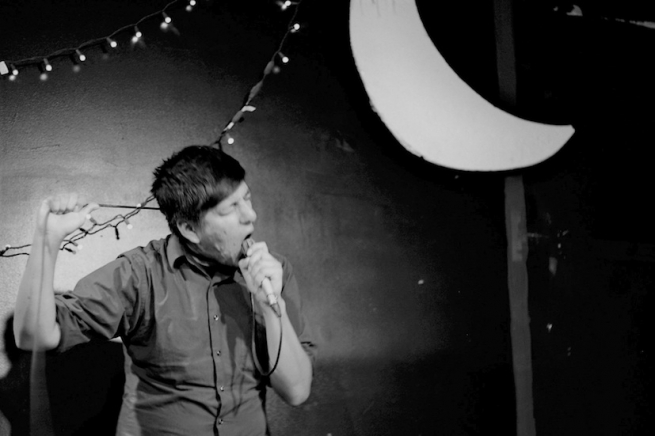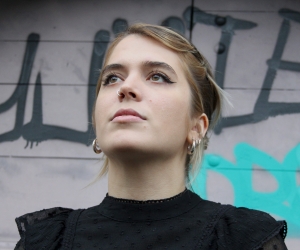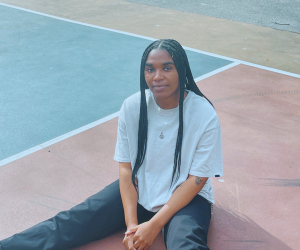
When Bret Parenteau’s name is attached to a release or performance, those familiar with his music find themselves wondering what kind of intensity the Winnipeg artist is unleashing this time. His work ranges through harsh noise, urban field recordings, and looping synth sounds, but the only way to find out which spices are in the soup on any given day is to press “play” or attend the show.
1980s power-electronics band Whitehouse and label Broken Flag, both British, are among the reference points that flutter through Parenteau’s brain when asked about his inspirations. At some point, he figured out that Fetor, the 1987 album by British power trio Pure, was all guitar, and decided that he wanted to try replicating the style. Those names are all revered in the power-electronics world, which is exactly where Parenteau wanted to make a mark.
“When I started I had no equipment, so went with what I had at home: two distortion pedals, a guitar; and I would just fiddle with the effects on my amp,” he recalls with a chuckle. “I’ve obviously come a long way since then.” This self-taught musician’s extended recollection of early experiments is dotted with reflections on his search for something upon which to fix his practice.
Parenteau pointedly cites a show that The Rita (Vancouver harsh-noise artist Sam McKinlay) played at the 2012 Send + Receive Festival as a crucial touchstone in his own development. “I had been obsessing over what [The Rita] was doing, looking up what kind of equipment he uses. Then he came to town, and it was an amazing show. Sticking his face underwater with contact mikes . . . It was wild and awesome.”
Parenteau bought a number of pedals, along with a six-channel mixing board, to continue honing a power-electronics project. His early works, under the name Gashkadin, are marked by brutal walls of noise accompanied by fierce, unhinged vocal lines. Around the same time, he stumbled into a passion for field recording and nearly every day spent time wandering about Winnipeg with a recorder. The practices soon converged: combining the sounds of the city with gruesome electronic howls became the technique track Parenteau had sought for his work, and it’s what makes his work stand out from that of other noise artists.
“It sounds so great when [field recordings] are underneath the noise,” he gushes. “I love a layer of melody behind all the grimy-sounding stuff.” A liberal interpretation of the word melody is required to appreciate what is being referred to: consider the manifold sound environments that exist in a city; the spectrum is almost indescribably vast. The collection of uncountable hours of field recordings became the range upon which Parenteau began to lay roaring noise.
That continues to be a part of his work, though Parenteau now releases work under his initials, B.P., because he figured that the name Gashkadin was irrevocably associated with power electronics. “I changed it to B.P. because that made it feel okay to release something that was just field recordings, or tape loops,” he explains. Such recordings are now slotted alongside his continued noise work, in an extensive catalogue of releases that are almost entirely cassettes, whose packaging features his visual collage work.
Numerous commentators have referred to cassettes as a democratizing technology, in that they present relatively minor barriers in cost and training for creators who itch to reproduce and share their work. In late 2012, Parenteau teamed up with Paul Kinasevych (who has since moved on) to begin a cassette label called Male Activity, which began as a vehicle to get their own work heard. In just a few years, it has released more than fifty recordings. Male Activity has never seriously sought out publicity, but the label and its operator keep getting noticed anyway. Parenteau gets so many unsolicited submissions that he’s started releasing international artists. Recordings by B.P. have been well-received outside of Canada, with labels in places like Australia, Austria, and California eager to release his work to his growing international fan base.
Parenteau shakes his head when speaking on the subject. “Since the start, I just post a photo to my Instagram page when there’s a new release and people start getting into it”—which is actually a comfortable, if technologically mediated, continuation of the decades-long practice of cassette artists swapping ideas and their work by mail.
In the forefront of his mind, however, is his home city. He calls for an increased focus on getting artists he admires to come and perform in the isolated burg. “People should know that Winnipeg is actually a great city for experimental music, and I think more artists should come here to do shows,” he says. To finish the thought, he shrugs, as so many others do when compartmentalizing his hometown. “There are a lot of people doing [sound art] here, but [also] the punk kids and indie kids . . . boundaries exist, but they still come out and appreciate what you’re doing.”


